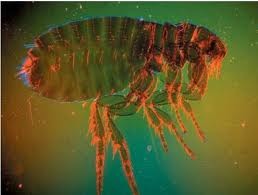Parasites - Unwanted Guests in the Temple!
By John M. BurgstinerFounder/President of Logos Nutritionals, LLC
The Centers for
Disease Control estimates that every year 76 million Americans become unwitting
hosts to parasites from their food. This
is a topic most people want to avoid... but ignorance is not bliss. Parasites
currently infect more than two billion people worldwide. Scientists estimate that half the people in
the world will be infected with some type of parasite by the year 2025.
 What are they? - Parasites are organisms that live inside other animals, receiving
nourishment and protection from their host.
They may be transmitted from animals to humans, humans to humans, or
humans to animals. There are over a
thousand species that can inhabit humans, ranging in size from microscopic
single-celled organisms to large worms.
What are they? - Parasites are organisms that live inside other animals, receiving
nourishment and protection from their host.
They may be transmitted from animals to humans, humans to humans, or
humans to animals. There are over a
thousand species that can inhabit humans, ranging in size from microscopic
single-celled organisms to large worms.
How are they transmitted? - Through contaminated food or water, or by putting something in your mouth that has touched the stool of an infected person/animal.
What symptoms do they cause? - Fever, abdominal pain/cramps, nausea, vomiting, muscle aches, fatigue, weight loss, diarrhea, and even intestinal obstruction. Once hatched in the gut, they can migrate anywhere in the body and compromise organ or even central nervous system function. Difficult to diagnose because symptoms mimic bacterial or viral infections, and many people experience little or no symptoms for years. Symptoms range from mild discomfort to debilitating illness and even death.
Why are parasitic infections becoming more prevalent? Military and other global travel, number of children in daycare, pollution, infected community swimming pools or pets, and overuse of antibiotics and other drugs.
Who is most at risk? - Persons with weakened immune systems, AIDS/HIV patients, organ transplant patients, chemotherapy patients, infants, travelers and hikers/campers who drink water from untreated sources.
Giardia duodenalis - Microscopic
parasite that can live in the intestines of animals and people. Found in every region throughout the world and
has become recognized as one of the most common causes of waterborne (and occasionally
foodborne) illness.
Cryptosporidium
parvum - Microscopic parasite and a significant cause of waterborne illness
worldwide. It is found in the intestines of many herd animals including cows,
sheep, goats, deer, and elk.
Toxoplasma gondii - Microscopic
parasite found throughout the world that carries out its reproductive cycle
only within members of the cat family (cats are definitive host). Most dangerous to fetus and infants.
Trichinella spiralis
- Intestinal roundworm whose larvae may migrate from the digestive tract
and form cysts in various muscles of the body. Infections most prevalent where
pork or wild game is consumed raw or undercooked. Not spread directly from person to person.
Taenia saginata/solium
(beef/pork Tapeworm) - Humans are definitive
host. Can live up to 30 years. Not common in
Prevention
- Wash hands, cutting boards, and other utensils thoroughly with hot, soapy water after handling raw meats, handling animals, changing diapers, using the toilet, after cleaning a litter box, and before eating.
- Cook all meats thoroughly to 160 degrees, especially pork or wild game.
- Drink bottled water. Do not swallow water while swimming.
- Wash, peel, or cook raw fruits and vegetables before eating.
- Do not use untreated manure to fertilize fruits and vegetables.
- Clean colon (daily fiber) and efficient digestion (enzymes and probiotics)
- Maintain strong and balanced immune system
Treatment Strategy
Cleansing program - Digestive Enzymes and probiotics to reduce undigested waste in the colon, periodic
colonics, herbal cleanses such as MagnifiCleanse, and Systemic Enzymes to cleanse the blood and control inflammation.
Herbal medicines - Garlic, goldenseal, barberry, Oregon grape, black walnut hulls, wormwood,
quassia, cloves, orange peel, grapefruit seed extract, rosemary, thyme,
oregano, or marshmallow. See our Parabolish.
|
|
|
|
|
* These statements have not been evaluated by the Food and Drug Administration. This product is not intended to diagnose, treat, cure, or prevent any disease.
2025 © Logos Nutritionals, LLC All Rights Reserved.




